Mental Health Awareness Month | 5 Ways to Boost Your Mood During Stressful Times
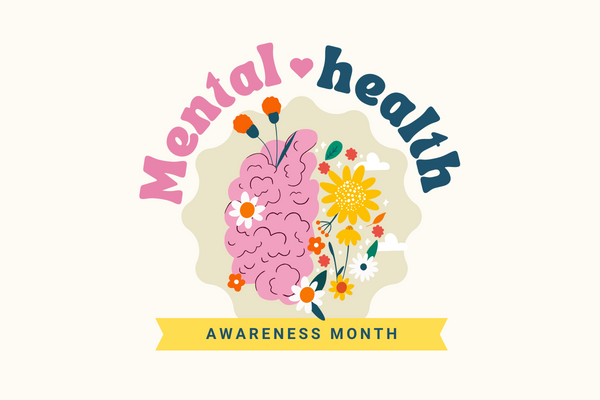
As parents, we often find ourselves prioritizing the needs of others before ourselves. From balancing our children’s schedules to maintaining our homes, it’s rare we find a minute to ourselves. In order to pour into others well, we need to also take care of ourselves.
It’s Mental Health Awareness Month, and a great way to look out for our mental health and maintain our well-being is by prioritizing ourselves. So how do we do that when the dishes are piling up, there are dirty diapers to change, the dog needs a walk, and the stressors just keep adding up?
We’ve found 5 ways to boost your mood and support your mental health during stressful times. Try them out!
1. Boost your mood with deep breathing.
During stressful times, our bodies often switch into “fight-or-flight” mode. This is the body’s way of protecting us from danger by releasing stress hormones from our brain. You may have felt this before: breathing becomes more rapid, heart rate increases, muscles tense up, skin becomes flush or pale.
When our bodies go into fight-or-flight mode, we are usually not in real danger. Typically, this is triggered by day-to-day stress. Piles of laundry we can’t catch up on, feelings of inadequacy at work, crying babies who won’t calm; sound familiar? When feelings of high-stress overwhelm you, try one of these deep breathing exercises for an instant mood-booster:
- Breathe deeply and slowly through your nose and let your belly rise. Exhale slowly releasing all the air.
- Breathe in through your nose for 4 seconds. Hold for 7 seconds. Exhale through your mouth for 8 seconds.
- Inhale slowly through your nose for 2 seconds. Pucker your lips. Exhale slowly through pursed lips for about 4 seconds.
Find more easy breathing techniques at https://www.healthline.com/health/breathing-exercise.
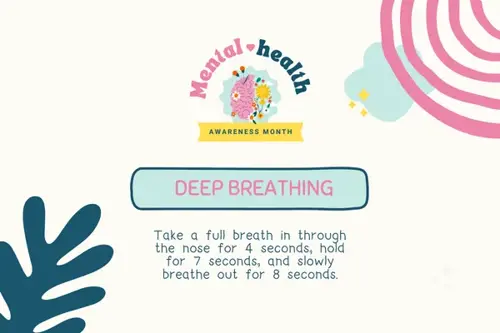
2. Shift into a positive perspective by practicing gratitude.
Gratitude impacts our mood by shifting our focus onto the positive things in our lives. And, similarly to exercise, practicing gratitude boosts our mood through a rise in dopamine and lowering stress hormones like cortisol.
During stressful moments, practice naming things you are grateful for. It can be as simple as having a roof over your head, or as specific as naming the people you are thankful to have in your life. Here are some things we are grateful for every day:
- Our amazing teachers and staff.
- Sunny days.
- Music we can move and groove along with.
- Yummy food and easy recipes.
- Fun activities with our kids.
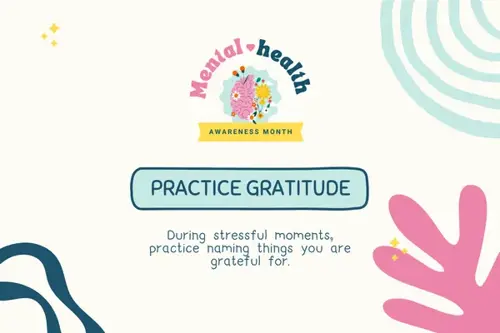
3. Improve your mental health by exercising regularly.
Exercising regularly has been shown to have numerous benefits for mental health, and of course, overall health. Physical activity releases endorphins, which are our brains’ natural mood boosters, and reduces the body’s stress hormones, like cortisol. That’s a two-in-one easy way to knock out stress.
Find simple ways to integrate regular exercise into your routine.
- Practice morning yoga or stretching before the kids get up, or have them try it with you!
- Take an afternoon walk during your lunch break and grab a friend to go along.
- Try out a fun Zumba class after work.
Adding daily exercise doesn’t have to change your entire routine; just add some movement into your day to boost your mood.
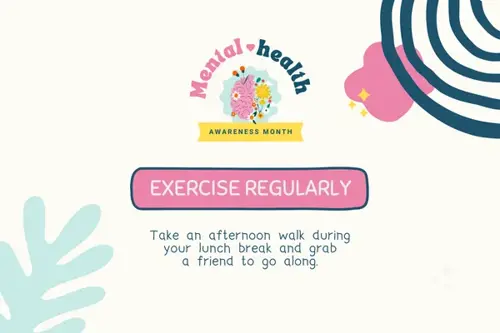
4. Decrease stress with a healthy diet.
Our diet plays a lot into how we feel each day. Fluctuation in blood sugar levels contributes to irritability and stress. To avoid spikes in blood sugar, limit processed foods and foods high in refined sugars or caffeine. Instead, focus on eating foods high in nutrients. Some of our favorite foods to help reduce stress include:
- Salmon: full of Omega-3 fatty acids, which can help reduce stress and depression.
- Spinach: packed with magnesium, which helps fight off headaches or fatigue.
- Pistachios: a good sources of healthy fats, which can protect against stress and inflammation.
- Avocados: loaded with vitamins C and B6, which help reduce stress, and potassium, which helps lower blood pressure.
- Berries: rich in antioxidants and vitamins to help boost mood and regulate stress.
Find fun ways to implement these foods into your diet. Make a berry smoothie with some spinach and avocado. Try out a pistachio crusted salmon recipe for dinner. Adding nutrient-dense foods will help boost your mood on a daily basis!
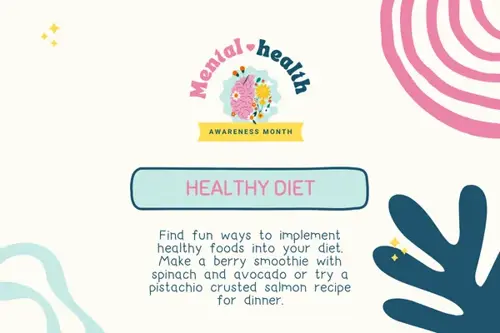
5. Reduce fatigue by prioritizing sleep.
Getting consistent quality sleep is essential for mental health because it helps to repair and restore our brains. Practicing a regular sleep schedule by hitting the sheets around the same time each night can help improve your mood, cognitive function, and overall well-being. It’s important for adults to get 7 to 8 hours of sleep each night to avoid exhaustion and other health issues.
Getting adequate sleep each night can help reduce stress and anxiety. Have a hard time falling asleep at night? Try:
- Limit caffeine consumption.
- Unwind at night with a bath and soothing music.
- Decrease screen time throughout the day.
- Read a book before bed with low lights.
- Avoid eating a big meal right before bed.
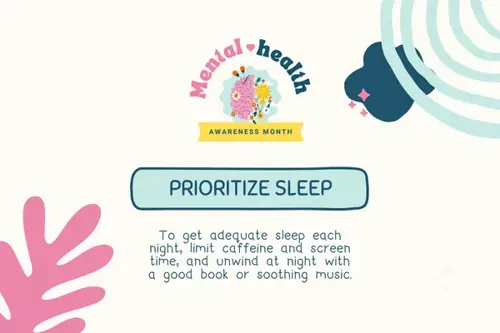
Prioritizing our mental health doesn’t have to mean changing our entire routine. It can be as simple as pressing pause and allowing space to take a few deep breaths, step outside for a moment in the sun, or enjoy a health snack to boost our mood.
Check out more quick tips on our Facebook page during Mental Health Awareness Month.


